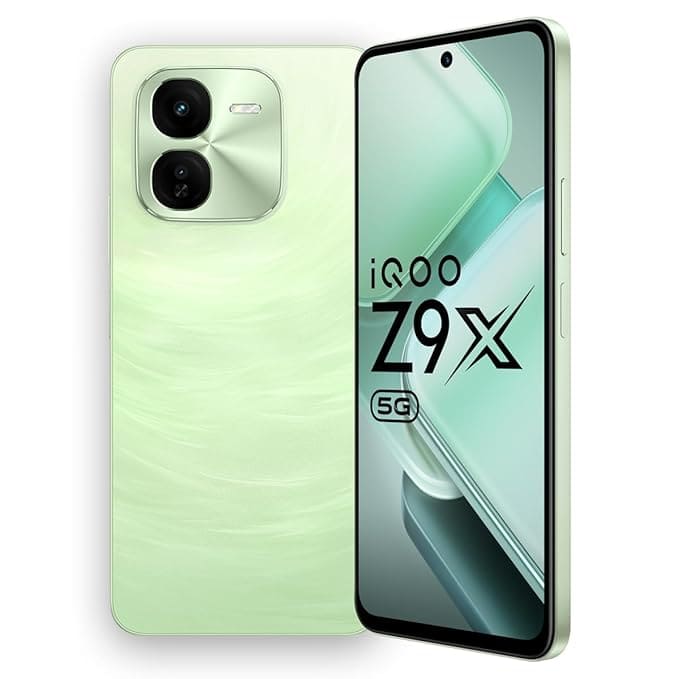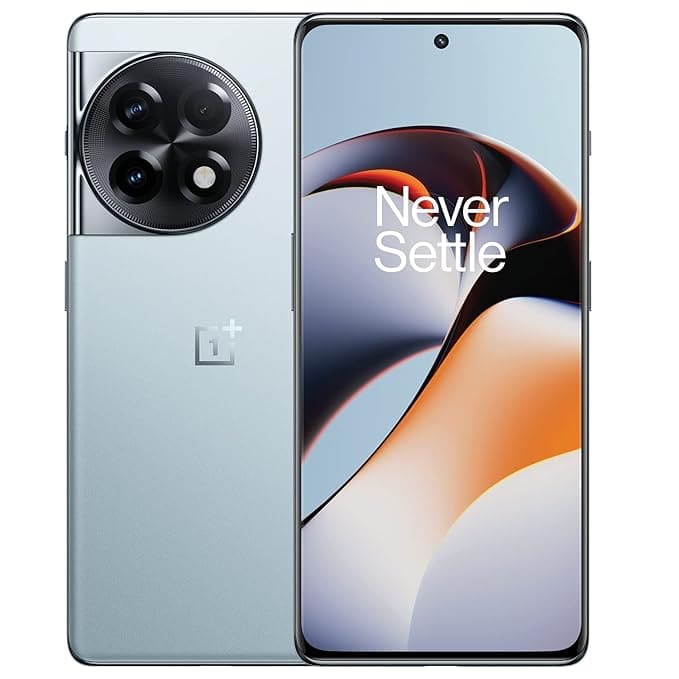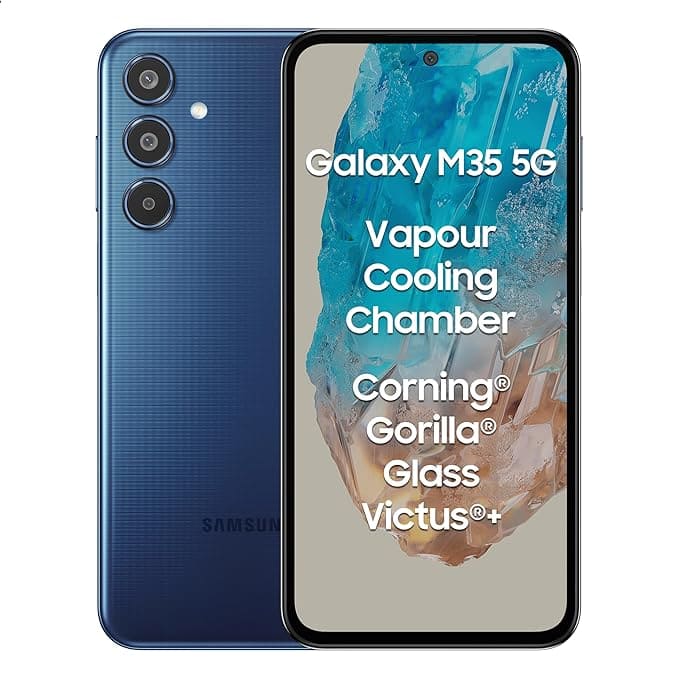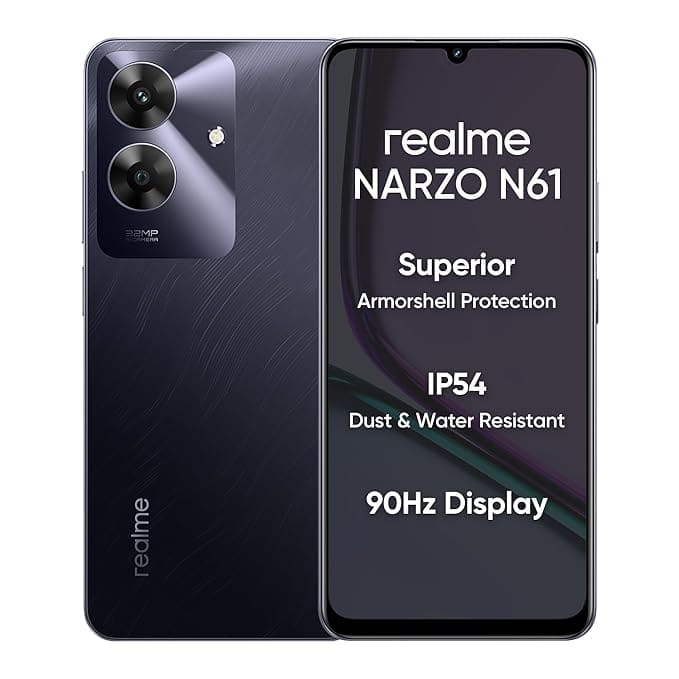English : Unit 5 : Prose : Tech Bloomers
Glossary
grapple (v)- to fight, especially in orderto win something
cerebral palsy (n)- permanent tighteningof the muscles caused by damage to the brain
Dragon Dictate (n)- a software whichrecognizes speech and converts it to text
assistive technologist (n)- a person whoassists with technological gadgets to overcome disability
gaze (v)- stare at something for a longtime
Liberator Communication Device (n)- aspecial device used to communicate with eye movements
inclusion (n) – the act of includingsomeone or something
cloister (adj) – enclosed by
collaborative process (adj) – produced byor involving two or more parties working together
WHILE READING QUESTIONS
a. What is the future of technology?
In future, all the machines and gadgets will be automated, making life a lot easier. Soon people can command smart TV’s and home applaiances by their gestures instead of using a remote. Refrigerators can self-replenish supplies, when they are about to be exhausted. In a few years, we will be talking about driver-less cars and robots working in factories.b. How many people in India suffer with disability?
According to the 2011 census, 2.21 percent of India’s population is disabled.
c. Who is Kim?
Kim is the Assistive Technologist at Alisha’s school.
d. How does Kim help Alisha?
Kim helps Alisha by introducing Dragon Dictate, a software which helps to transfer her speech into words on the screen.
e. Why is technology important according to David?
According to David, technology is important, as it enables him to communicate, and be independent. It can help people like him to make friends, control their environment, study and find jobs.
f. Which instrument does David control with his eye movements?
David uses a Liberator Communication Device for verbal communication. He controls it with his eye movements.
g. What devices help David to move from one place to other?
Liberator Communication Device, ACTIV controller, AAC device and ECO2 with ECO point are the devices that help David to move from one place to other.
A. Answer the following questions in two or three sentences.
1. What are the benefits of the internet to the common man?
The internet allows the users to get access to ali sorts of information. A person can communicate face to face with his friend anywhere in this world. One can send money to foreign country, reserve tickets for their journey, pay bills and apply for overseas studies from any place through internet.
2. Do you think technology has improved communication? How?
Yes, technology has definitely improved communication. A person can communicate face to face with his friend anywhere in this world. It has enabled people to stay connected with friends and relatives who live far away.
3. How does David operate computers with the Liberator Communication Device?
The Liberator communication Device has an in-built Bluetooth adaptor. David sends commands to the computer through the Liberator. He controls it with his eye movements.
4. Which devices are controlled using ACTIV controller?
David controls his TV, Blu-ray and music players using an ACTIV controller. This device is attached to the headrest of his chair in his bedroom.
5. Who says these words: “I want everyone to know the difference technology has made in my life”?
Alisha is a disabled girl who suffers from cerebral palsy. Amazed at the wonders of technology she says, “I want everyone to know the difference, technology has made in my life”.
6. Which software helps Alisha to overcome her difficulty in typing?
Alisha has trouble with typing. So she uses an advance technology called Dragon Dictate to overcome this problem. The software types words on Alisha’s Screen when she speaks.
7. Name a few Indian innovations which are helpful to the disabled and make their day to day life easier.
· *LechaI shoes have GPS and Bluetooth that facilitate the disabled to navigate streets. Instructions are displayed in the map software on their smartphones.
· *Blee watch converts soundwaves into vibrations for the hearing impaired. Colour codes are used to alert them to various emergency sounds.
· *IGEST tracks gestures of the speech impaired and speaks for them.
8. Is it possible to control the computer screen with eye gaze?
Yes, the ECO point Eye gaze system can be effectively used to access computers.
9. Suggest ways of making our society inclusive.
A society is inclusive only when each and every individual has empathy. Facilitating people with impairments is the noblest act of humanity. Opportunities must be given to exhibit or bring out their skills.
10. How would you help the people with disabilities in your neighborhood?
I would introduce them to new technologies that are guaranteed to transform their lives. There are so many high-tech technologies that people are still ignorant of. Awarness is the solution. Technology helps the disabled to be independents, confident and competent.
B. Answer in a paragraph of about 100–150 words.
1. How do we use technology in our day to day lives?
Prose : TECH BLOOMERS
Theme : Technology is a life changer
Prose outline : We live – era of advanced technology – revolutionized our world – access information – more services – modern devices – technology for disabled persons – made our lives easier, faster, better
We are living in an era of advanced technology. Over the years, technology has revolutionized our world. Technology has created amazing tools and resources, putting useful information at our fingertips. It allows the users to get access to all sorts of information. New methods of electronic communication, such as social networking websites, emails, voicemails, and video conferences have eliminated boundaries of time and distance. One can send money to a foreign country, reserve tickets for his/her journey, pay bills and apply for overseas studies from any place through internet. Modem technology has made it possible for the discovery of many functional and utility devices like the smartphone, tablet and the smartwatch. Technology is also a boon to the people with special needs. It enables the disabled persons to communicate, and be independent. It can help people like them to make friends, control their environment, study and find jobs.Thus technology has also made our lives easier, faster, better and more funny.
ESSAY
• Introduction
• Electronic means of communication
• Uses of internet
• Modern Technology
• Technology for Disabled Conclusion
Introduction:
We are living in an era of advanced technology. Over the years, technology has revolutionized our world. Technology has created amazing tools and resources, putting useful information at our fingertips.
Electronic means of communication:
It allows the users to get access to all sorts of information. New methods of electronic communication, such as social networking websites, emails, voicemails, and video conferences have eliminated boundaries of time and distance.
Uses of internet:
One can send money to a foreign country, reserve tickets for his/her journey, pay bills and apply for overseas studies from any place through internet.
Modern Technology:
Modem technology has made it possible for the discovery of many functional and utility devices like the smartphone, tablet and the smartwatch.
Technology for Disabled:
Technology is also a boon to the people with special needs. It enables the disabled persons to communicate, and to be independent. It can help people like them to make friends, control their environment, study and find jobs.
Conclusion:With all of these revolutions, technology has made our lives easier, faster, better and more funny.
2. “Technology is a boon to the disabled”. Justify.
Lesson : TECH BLOOMERS
Theme : Technology is a boon
Prose outline : Technology – enabled the disabled – Alisha – cerebral palsy – uses Dragon Dictate – David – Athetoid cerebral palsy – uses Liberator Communication Device – be independent – boon to the disabled.
Technology has been registering an unbelievable growth in the recent decades. It has enabled the disabled to perform their day-to-day activities just like a normal person. Alisha is a disabled girl who suffers from cerebral palsy. She has trouble with typing. So she uses an advanced technology called Dragon Dictate, a software which helps to transfer her speech into words on the screen. Alisha feels that technology has made her more independent. David was bom with Athetoid cerebral palsy. Modem technologies such as the Liberator Communication Device, ACTIV Controller, AAC, and ECO2 have enabled him not only to communicate freely but also to control his environment. According to David, technology is important, since it enables him to communicate, and to be independent. Stephan Hawking, World’s renowened physicst was successful only because of assistive technology. Thus technology can help people like Alisha and David to make friends, control their environment, study and find jobs. Really, Technology is a boon to the disabled.
ESSAY
• Introduction
• Alisha’s Life
• David’s Life
• Stephan Hawking
• Conclusion
Introduction:
Technology has been registering an unbelievable growth in the recent decades. It has enabled the disabled co perform their day-to-day activities just like a normal person.
Alisha’s Life:
Alisha is a disabled girl who suffers from cerebral palsy. She has trouble with typing. So she uses an advanced technology called Dragon Dictate, a software which helps to transfer her speech into words on the screen. Alisha feels that technology has made her more independent.
David’s Life:
David was born with Athetoid cerebral palsy. He has been using a high tech communication aid, since he was eight years old. Modern technologies such as the Liberator Communication Device, ACTIV Controller, AAC, and ECO2 have enabled him not only to communicate freely but also to control his environment. Technology has helped him so much that he was even selected to work with the Olympic Opening Ceremony in Brazil. According to David, technology is important since it enables him to communicate, and be independent
Stephan Hawking:
World’s renowned physicist, Stephan Hawking is the best example for using assistive technology as a boon. It helped him to overcome his physical impairements and assisted him to contribute to the world productively.
Conclusion:
Thus technology can help people like Alisha and David to make friends, control their environment, study and find jobs. Really, Technology is a boon to the disabled.
Moral: “It is not that we use technology, but we live technology”
Vocabulary
Abbreviations, Acronyms and contractions
Abbreviations and acronyms are shortened forms of words or phrases. An abbreviation is typically a shortened form of words used to represent the whole (such as Dr. or Prof.) while an acronym contains a set of initial letters from a phrase that usually form another word (such as radar or scuba).
Abbreviations and acronyms are often interchanged, yet the two are quite distinct. The main point of reference is that abbreviations are merely a series of letters while acronyms form new words.
We use contractions (I’m, we’re) in everyday speech and informal writing. Contractions, which are sometimes called ‘short forms’, commonly combine a pronoun or noun and a verb, or a verb and not, in a shorter form.
Contractions with I, you, he, she, it, we, and they
’m = am (I’m)
’re = are (you’re, we’re, they’re)
’s = is and has (he’s, she’s, it’s)
’ve = have (’ve, you’ve, we’ve, they’ve)
’ll = will (I’ll, you’ll, he’ll, she’ll, it’ll, we’ll, they’ll)
’d = had and would (I’d, you’d, he’d, she’d, it’d, we’d, they’d)
Contractions with auxiliary verb and not
The contraction for not is n’t:
aren’t = are not (we aren’t, you aren’t)
can’t = cannot
couldn’t = could not
didn’t = did not (I didn’t, they didn’t)
C. Pick out the contractions from the lesson and expand them.

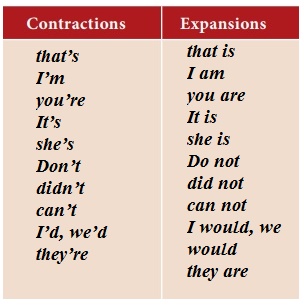
Contractions : Expansions
that’s : that is
I’m : I am
you’re : you are
It’s : It is
she’s : she is
Don’t : Do not
didn’t : did not
can’t : can not
I’d, we’d : I would, we would
they’re : they are
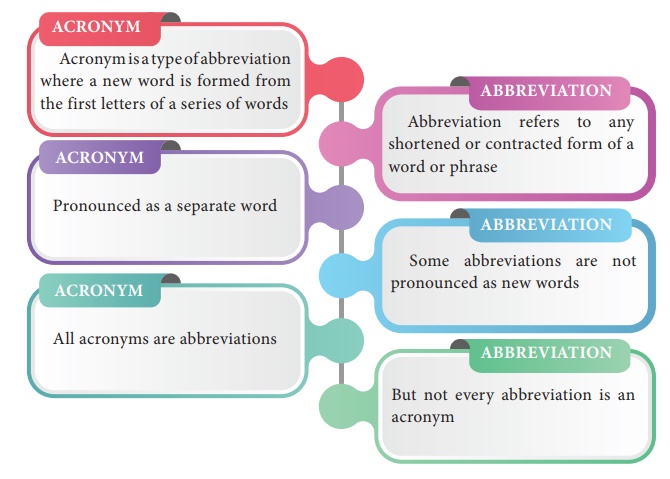
We can abbreviate the following:
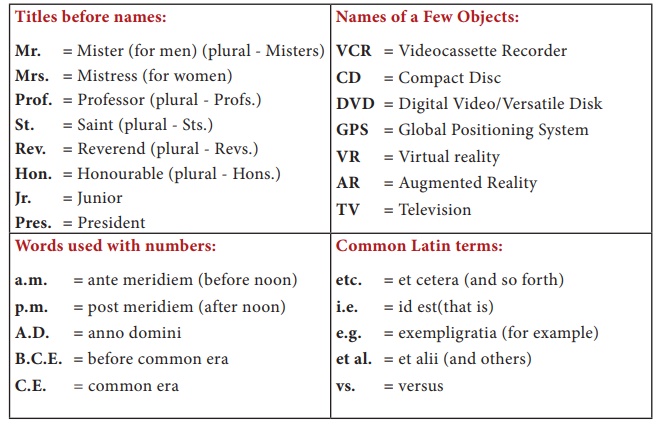
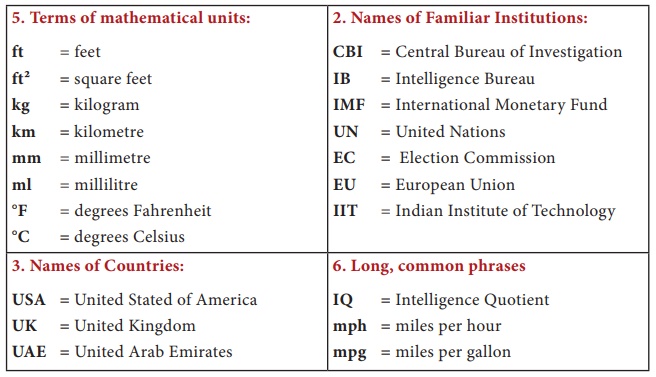
D. Expand the following abbreviations or acronyms

1. SIM : Subscriber Indcntification Module
2. ISRO : Indian Space Research Organization
3. WHO : World Health Organization
4 CCTV : Closed-Circuit Television
5. HDMI : High-Definition Multimedia Interface
6. LASER : Light Amplification by Stimulated Emission of Radiation
7. MRI : Magnetic Resonance Imaging
8. CRY : Child Rights and You
9. RAM : Random Access Memory
10. ROM : Read-Only-Memory
11 CPU : Central Processing Unit : . •
12. ALU : Arithmetic Logic Unit
E. Complete the sentences with the correct abbreviations or acronyms from the given list.
a.m. etc. BCE e.g HD m IQ GPS p.m. vs
1. My dad wakes up very early in the morning because he has to be at work at 6.00 a.m.
2. Socrates, the famous Classical Greek Athenian philosopher, died in 399 BCE.
3. Leonardo Da Vinci was a famous Italian polymath, a painter, a sculptor, an architect, a musician, a scientist etc.
4. I usually return home from work at 10.30 p.m. .
5. John downloaded a clip from YouTube in HD quality.
6. There are many irregular verbs in the English language, e.g. break, do, make.
7. I’m watching a great football match, Barcelona vs Real Madrid.
8. Humans who dive without protection can survive 300 m under water.
9. A 11-year-old girl just beat Einstein on an IQ test.
10. We used the GPS facility to track the location.
Listening
F. Listen to the passage and state whether the statements are true (T), false (F) or no information (N)?
1 Santhiya can’t live without her mobile phone. – False (F)
(Santhiya is not crazy about her mobile phone but she feel safe when she have it with her.)
2 She got her mobile in January. – No information (N)
3 Her parents bought her the mobile phone one year ago. – False (F)
(Santhiya got it from her parents for her birthday two years back.)
4 There’s a calculator in her mobile. – True (T)
5 She can connect to the Internet on her mobile. – True (T)
6 She usually listens to music on her mobile. – No information (N)
7 She can’t read emails on her mobile. – False (F)
(Santhiya can use her mobile phone to connect to the Internet and look through the news or read emails)
8 There are often a lot of problems with mobile phones. – True (T)
9 Santhiya always talks on her mobile to her friends. – False (F)
(Santhiya always keep it in her bag or in her pocket so her parents and her friends can always call her.)
10 She doesn’t like mobile phones. – False (F)
(Santhiya is not crazy about her mobile phone but she feel safe when she have it with her.)
G. Listen to the passage again and answer the questions.
1 Where does Santhiya keep her mobile?
Santhiya keeps her mobile in her bag or in her pocket.
2 What can she use it for?
Santhiya use her mobile to contact her parents and friends whenever she wants and vice versa. She uses it to calculate, connect to the Internet and looks through the news or reads her emails.
3 When was she cycling?
Santhiya went cycling with her friend on a holiday a year ago.
4 What happened there?
It started raining. Her friend fell off her bike and broke her leg.
5 How did Santhiya solve the problem
Santhiya immediately telephoned for help. A doctor arrived just in time.
H. Complete the sentences after reading the passage.
1 Santhiya’s parents and friends can always call/contact her.
2 Her mobile phone is also a kind of information file.
3 On the cycling holiday after the accident Santhiya phoned for help.
4. Mobile phones often ring at the wrong moment.
5. Children can feel safe when they have their mobile phones with them.
Speaking
PUBLIC SPEAKING SKILLS
Public speaking involves communicating information before a large audience. In public speaking, the information is purposeful and meant to inform, influence or entertain a group of listeners.

A FEW STARTERS FOR WELCOME ADDRESS
· Itis our pleasure to introduce our chief guest as the speaker for this evening. We cannot think of a person more qualified to address the audience.
· Young minds are like sponges and they are looking for the right input to soak it in. We cannot think of a person more suited to this than our guest of honour to whom we extend a warm and hearty welcome.
· It’s my pride and privilege to introduce our chief guest Mr/Mrs. (or) Thiru/ Thirumathi who is very well known to you because of his service to mankind in the field of education.
A FEW STARTERS FOR VOTE OF THANKS
· Respected Chief guest, Principal , teachers, students, ladies, and gentlemen, good evening. It is my honour and privilege to propose the vote of thanks to this august gathering. I would like to thank Principal madam for giving me this opportunity.
· Today my words are not enough to express my gratitude. On behalf of the organizing committee and our school, I would like to thank our Chief Guest for the day, Mrs./ Mr./Thiru/Thirumathi, who graced the occasion with his/her presence and guidance.
· We are grateful to all the parents present here, your encouragement has helped us to organise such important events.
I. Prepare on any one of the topics given below and present before your English teacher.
· Prepare a welcome address on the occasion of Republic day celebration.
Warm greetings and a very warm welcome to all of you present here, with a special mention of our Honourable chief guest, principal, vice principal and all teachers. It gives me immense pleasure to deliver the welcome address on this auspicious occasion. We are here to celebrate one of the most significant events in the History of India. We are gathered to celebrate the 70th Republic day, an event that is cherised by all Indians regardless of age, caste or creed
India got its independence from the British on 15th August 1947. Our Constitution became effective on 26th Jan 1950 which we all celebrate as the Republic Day. I take this opportunity to salute the valiant members of our armed and para-military forces who safeguard the territorial . integrity unmindful of their lives. Let us all gratefully recall the sacrifice of millions of freedom fighters and unsung martyrs, who laid down their lives so that we are a free Republic nation today. They have laid down their lives for the future generation to live freely without any struggle.
“Ask not what your country can do for you,
Ask what you can do for your country”
Let us join hands in eliminating crime, corruption, violence, poverty, unemployment and slavery that are holding our country back from moving towards main stream development. Every individual should make an effort to transform our country into a different place altogether.
Thank You
· Prepare a Vote of thanks on the occasion of Independence day celebration.
The best and beautiful things in the world cannot be seen or even be touched. They must be felt by heart. “Thank you” is one such prayer among them. I consider it a great privilege to propose the vote of thanks to all the dignitaries who have witnessed this independence day celebration a successful and joyful event. I take this opportunity to thankfully remember all our freedom fighters who fought for our well being. We must be grateful to them for without then sacrifices we would have been living a life of struggles. I fall short of words to express my heartfelt gratitude to our chief guest who graced us with his address on the brave deeds of our leaders who fought for our nation’s freedoms. I extend my gratitude to our principal who was the source of energy behind this celebration. Heart felt thanks to all our teachers who always stand by us, guide us and motivate us. I thank all the organizers for their co-operative work and support. Last but not least I thank all the students for being a cheerful and lively audience.
Thank you.
· Mock anchoring for annual day celebration
Good Morning Ladies and Gentlemen! A warm welcome to our Chief Guest, teachers, organisers and of course my dear friends.
Event: 1 Invocation to Goddess Tamil:
Looks like we have a spectacular Weather, let’s thank god Almighty for that. Let us start this program with the invocation of our Tamil Goddess. I request all of you to stand for that.
(Everyone sings Tamil Goddess’s Invocation)
Thank you.I, Amanda shall be your host for the day. I consider this opportunity a great pleasure. On behalf of the management, I heartily welcome you all to this wonderfiil program which will create some beautiful memories for us all.
We feel honoured to have amidst us, our vibrant chief guest, who has graced us with her presence today. Without much delay let’s open our hearts to the joy to come.
Event: 2 Welcome Address:
I call upon Abdullah of class 10 to deliver the welcome address.
(Abdullah delivers the welcome address)
Thank you Abdullah.
Event: 3 Annual Report:
An annual report will now be read by our respected Principal.
(Principal reads the annual report)
Thank you Ma’m. Our achivements don’t stop these, they will continue to bloom.
Event: 4 Chief Guest Address:
Everyone of here is awaiting for our honourable chief Guest’s address. I invite him on behalf our institution. Welcome Sir/Madam.
(Chief Guest’s Address)
Thank you sir. We are fortunate to have your guidance and support.
Event: 5 Song:
Now this is the time, we have been eagerly waiting since morning. Now prepare yourselves to be drenched in melody, for Sheela of class ‘12’ is going to captivate our hearts with her enchanting song.
(Sheela sings a song)
Thank you Sheela. The song is still echoing in our hearts.
Way ta Succeed &
Event: 6 Dance:
“We dance for laughters, We dance for hope We are the dancers, We create dreams.”
Next we have a dance performance by Mugil of class ‘8’. I’m sure she will cast a spell on us with her elegant steps. . .
(Mugil dances)
Thank you Mugil. That was indeed a spell casting dance, pure elegance combined with passion. . ‘ ,
Event: 7 Special drama:
“Dramas are created to tell the truth about life”
Here we have a thought-provoking drama by David and his team, Go ahead and entertain us. (David team’s Drama goes on)
Thank you friends. It was fabulous! You made us think and you have enlightened us.
Event: 8 Vote of Thanks:
“Gratitude is the fairest blossom that springs from the soul”
Tamilarasn of class 12 will propose a vote of thanks.
(Tamilarasan proposes vote of thanks)
Thank you Tamilarasan. Now I request all of you to stand up for the National Anthem.
· Collect images of some electronic gadgets and play a JAM (just a minute) game by picking one image and talking for a minute about it in your classroom.
Hi friends, I’m about to talk about washing machine. Anyone can use a washing machine. All they have to do is to put the clothes in and push the button, the work is done. It is a time saver. In the sense it does not consume much time to wash the clothes. In times of sickness, a person can use it to wash all their clothes instead of hiring anyone to do all that.
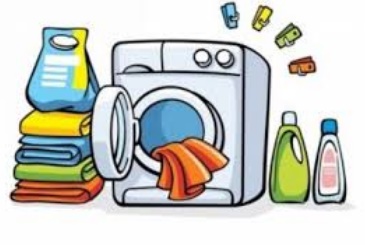
But Washing machines consume a large amount of water compared with manual washing. Electricity charges go up when it’s used continuously. Washing clothes is a great exercise to the body. But with the advent of washing machine, people lack such exercises. So use washing machine only when you really need it, else go with manual washing.
Read the comic strip and answer the following questions.
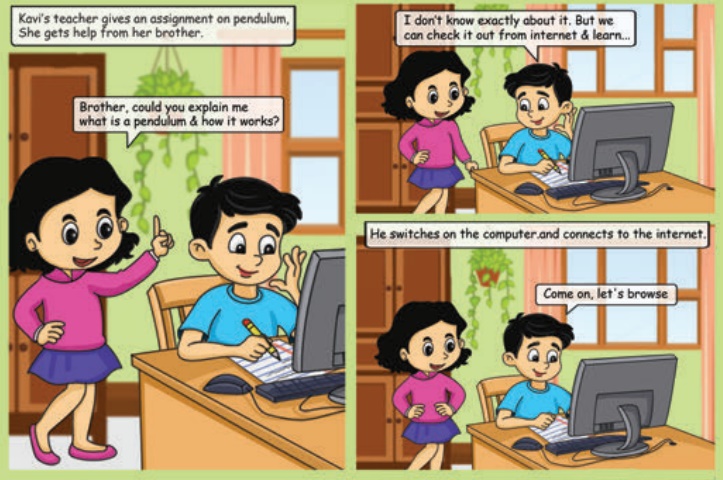
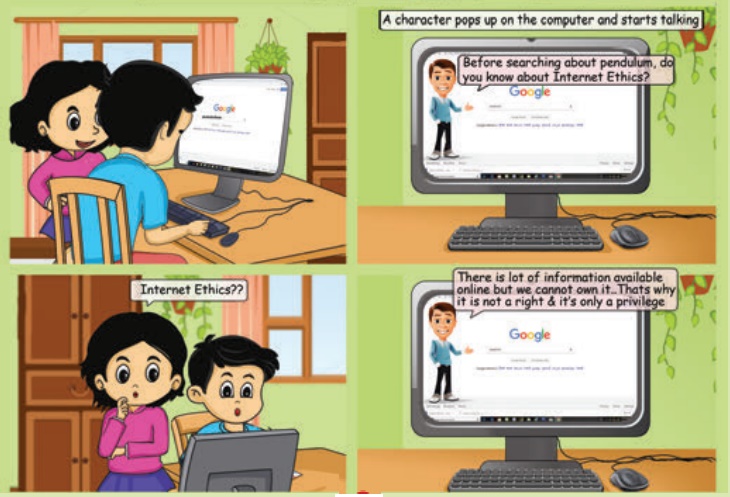
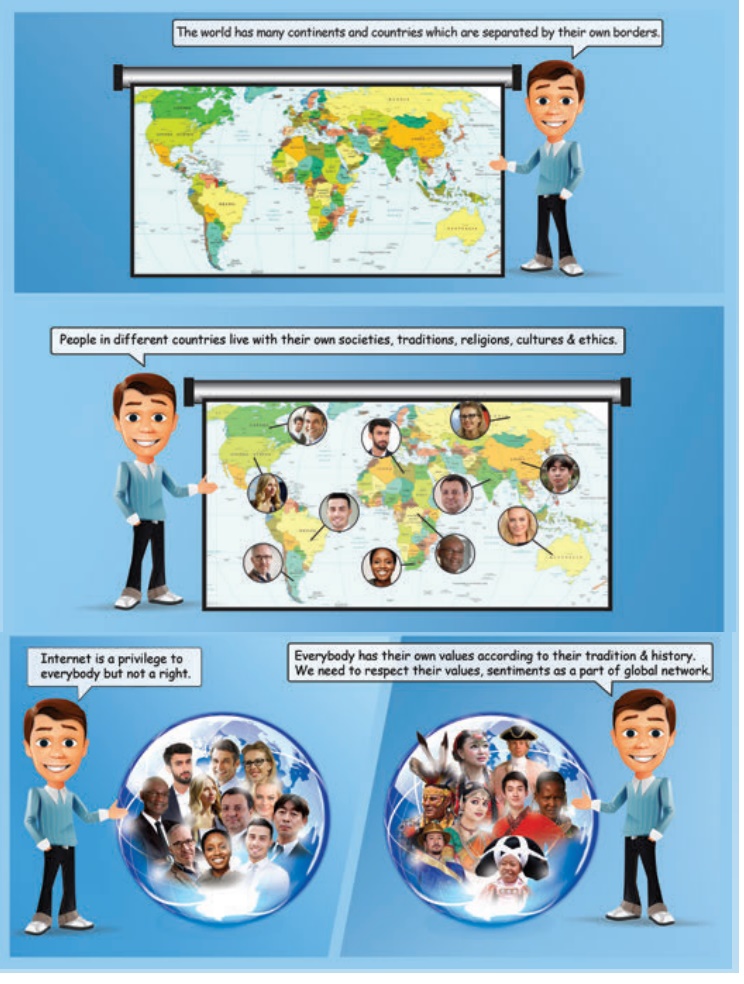
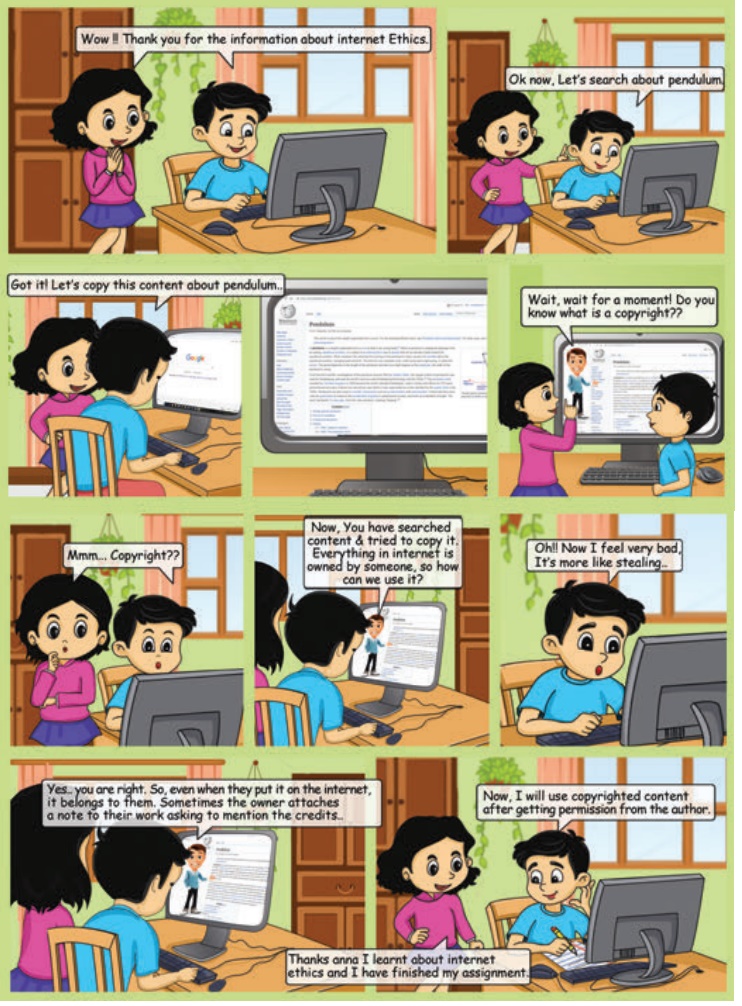
J. Read the comic strip and answer the following questions.
1. What do you mean by cyber safety?
Cyber safety is the safe and responsible use of information and communication Technologies (ICT) available in internet.
2. How do you behave in a virtual platform?
Users must follow internet ethics at all costs. Internet ethics is a set of moral principles that regulate the use of the internet. Common issues of internet ethics include intellectual property rights (Eg: Copyright electronic content), Privacy concerns and how computer affects society.
3. Can we read and access the information free of cost?
Internet users can read and access information free of cost but they must not claim it as their own. “Internet is a privilege and not a right.”
4. Do you think that all the information online can be used without any permission?
No, not all the information available online can be used without permission. While it is easy to duplicate copyright electronic content, internet ethics would suggest that it is wrong to do so without the author’s approval. After getting the author’s permission the copyright content can be used.
5. Which website do you often access? Why?
I access www.brainkart.com, www.waytosuccess.org frequently because it has many free study materials, model question papers, standard wise unit tests.& many video tutorials & motivational videos.
google.com for search, youtube.com for video.
Writing
Short for electronic mail, e-mail or email is information stored on a computer that is exchanged between two users over telecommunications. More plainly, e-mail is a message that may contain text, files, images, or other attachments sent through a network to a specified individual or group of individuals.
Sample email
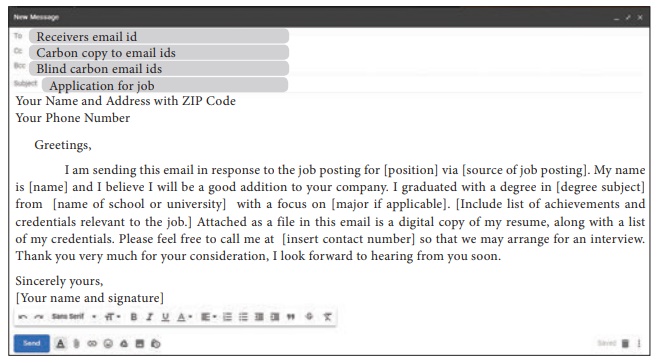
Example greetings:
Dear + name; Hi + name; Hi; Hello + name; Hello; To whom this may concern
Example opening sentences:
Following our recent telephonic
conversation, I’m attaching …
Please find attached the documents you
With regard to …
As we agreed at our meeting …
In response/reply to …
Example closing sentences:
I look forward to hearing from you
Please don’t hesitate to contact me
Thank you in advance
I await receipt of
Finish with:
Sincerely,
Best Regards/Regards
Best wishes
EXERCISE
K. Fill in the missing words in this email.
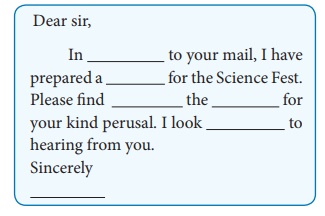
Dear sir,
In regards/response to your mail, I have prepared a model for the Science Fest. Please find corrections in the mail/attachment for your kind perusal. I look forward to hearing from you.
Sincerely
Amudha.S
L. Write an email to your teacher about the interesting English model that you have prepared for the literary fest.
To : [email protected]
CC : ….. ….
BCC : ….. ….
Subject: English model for the Literary Fest by Jenifer
Ph.No.**********
Dear Madam,
Ma’am, I’m Jenifer, a student from class 10. With regards to your announcement on literary Fest, I’m really interested to take part in it. So I put all my efforts in making a very interesting English model for the fest. I name it ‘Grammar Flip Book’. It includes almost 10 Grammar topics described in an elaborate & easy manner. I showed it to my parents and friends, they appreciated me. I can’t wait to show it to you ma’am.
Sincerely Yours,
Jenifer
MESSAGE WRITING
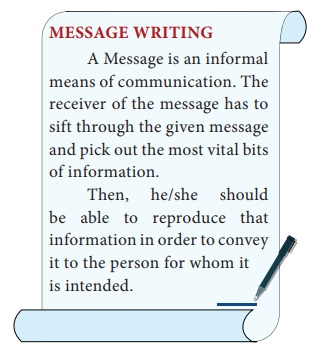
Format
· Date:
· Time:
· Name of person to whom the message is directed
· Body of the message
· Name of the writer
Points to remember
· While writing the body of the message, the following points have to be kept in mind
· Only the most important details should be written.
· No new information should be added.
· Grammatically correct sentences should be used.
· Indirect or reported speech should be used.
· The message should be presented within a box.
· The word limit for a message is 50 words (only the words in the body of the notice are counted).
Example Message
Riya, a student of class ten, is instructed by her teacher to convey to her classmates about the English Literary club competitions which are to be held on 09.04.2019 in a nearby Government school.
MESSAGE
03 April 2019
Dear Friends
Our teacher has asked me to inform all of you about the English Literary club competitions to be held on 9th of April at the nearby Government Higher Secondary School. Kindly get permission from your parents to attend the event. If you wish to participate in the competitions contact me at the earliest.
Srikanth
M. PRACTICE EXERCISE
You are the receptionist of your school. Your Head master instructs you to send a message to all the parents of class ten to attend a PTA (Parent Teacher Association) meet which is to be held on 22.12.2019
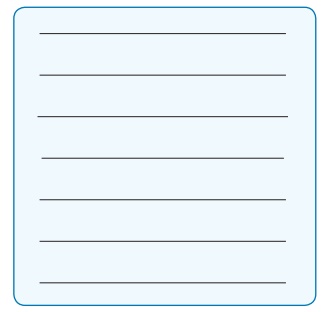
18.11.2019
Dear Parents,
The Head Master of our school has directed me to send a message regarding the PTA meet which is to be held on 22nd of December. You are requested to kindly attend it, as it can help you to track your child’s progress in acedemics and performance in co-curricular activities.
Afrin Banu.
Creative Writing
Let us Become Blog writers
A blog is a type of website that focuses mainly on written content, also known as blog posts. In popular culture we most often hear about news blogs or celebrity blog sites. Bloggers often write from a personal perspective that allows them to connect directly with their readers.
In addition, most blogs also have a “comments” section where readers can correspond with the blogger. Interacting with your readers in the comments section helps to further the connection between the blogger and the reader.
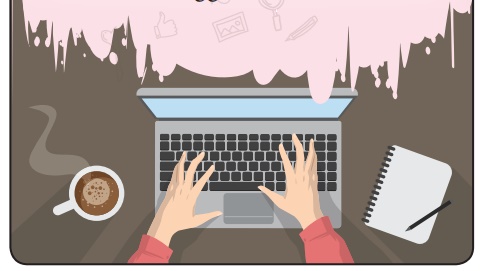
How to Start a Blog?
Create a blog in about 20 minutes following these steps:
Pick a blog name. Choose something descriptive.
Get your blog online. Register your blog and get hosting.
Customize your blog. Choose a free template and tweak it.
Write and publish your first post. The fun part!
N. Write about Your Favourite Sports person/ Famous personality/Hobby/ Recipe by starting your own blog.
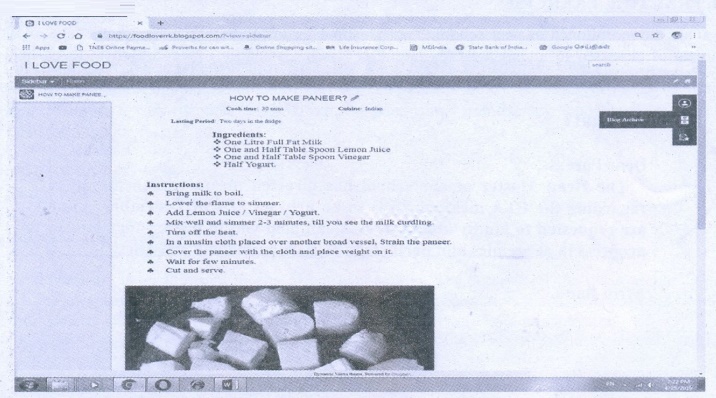
Grammar
PRONOUNS
A pronoun is a word or phrase that substitutes a noun or a noun phrase. There are ten types of pronouns generally used.
Read the stories of Ravi and Rani.
Ravi is an intelligent boy. Ravi lives in a small village. A chill breeze touches the skin, a cool lake with swans swimming on the lake catches the eyesight. Ravi loves nature a lot. Ravi is studying in class ten in a government school. Ravi loves helping others. When a woman was crossing the road with heavy luggage, Ravi asked the woman, “May I help you?” and carried the luggage and dropped the luggage at home. The woman thanked Ravi for the help.
Rani is a brilliant girl. Rani lives in an urban area where huge buildings touch the sky, buzzing noise of traffic hit the ears and crowds move busily towards work. One day when Rani was on the way to school, Rani saw a dog hurt by a moving scooter. At once Rani went near the dog, lifted the dog and rushed to a veterinary doctor. The dog, after recovering, shook the tail to thank Rani.
A. Write the words that can replace Ravi, Rani, woman, luggage and the dog when we use them for the second and subsequent times in the passage
Ravi -> He ,
Rani, the woman -> She
the luggage, the dog -> It
These words are called Personal pronouns.?
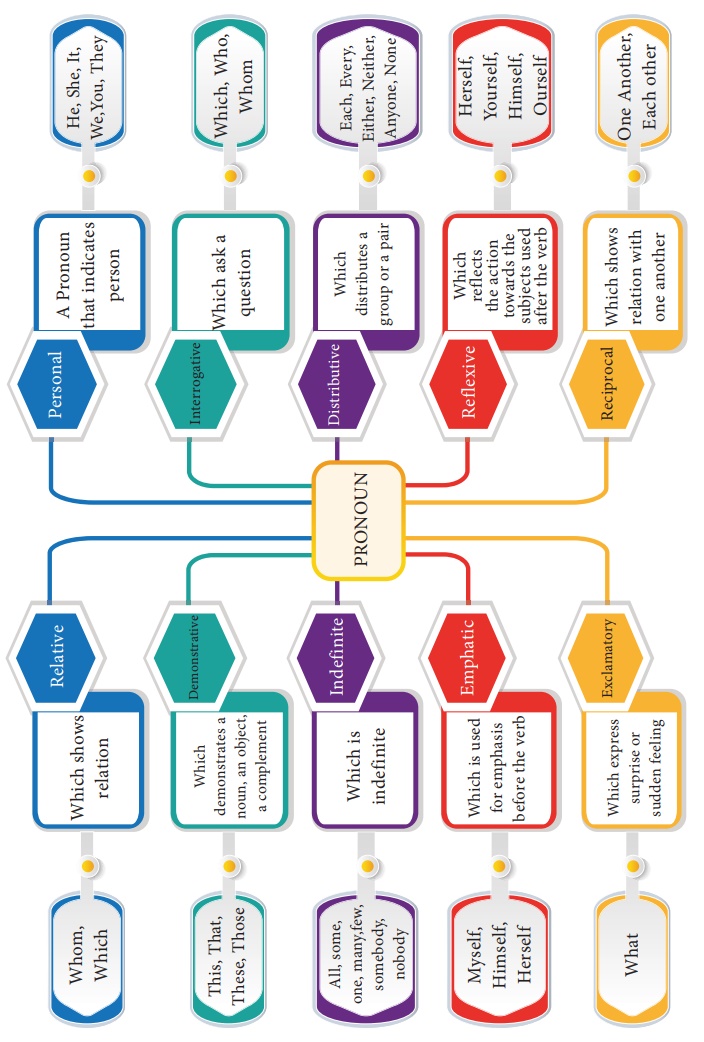
B. Fill in the gaps with personal pronouns.
Kumaravel lives in Thiruvannamalai. He is a doctor. All the people like him because of his helping nature. His hospital is located at Car street and most of his patients are poor so he does not charge much money. His daughter goes to school. She studies in 5th Standard. Her teachers love her very much. Her friends are also very good. They always encourage her. They have given her good advice. Her mother is also a teacher. She always encourages her to keep studying. I also like her as she often comes to my house. One day she told my mother that she wants to learn cooking. My mother taught her cooking. Now, she cooks well.
C. Fill in the gaps with appropriate Pronouns.
1. This / That is an excellent opportunity.
2. Either / Neither / Each of these two students can solve this question.
3. These / Those books have been written by a great Indian writer.
4. I / They / We have come to know the truth.
5. Some / All / Few of the students have passed the exam.
6. Some / All / Few of your friends can guide you.
7. This is your story based on your real life.
8. All your friends will guide you.
9. Some of his family members would come to visit you.
10. None / Some of those books will be helpful to you.
11. It is your bag, you can take it anytime.
12. He himself is responsible for the downfall of his life.
D. Join the sentences using ‘ Relative Pronouns’.
1. I have book. It is written by Rabindranath Tagore.
Answer: I have a book which / that is written by Rabindranath Tagore.
2. Kavita is my teacher. She teaches us English.
Answer: Kavita is my teacher who teaches us English.
3. This is Varun. His father is an architect.
Answer: This is Varun whose father is an architect.
4. She invited most of her friends. They attended the party.
Answer: She invited most of her friends who attended the.party.
5. Give me a pen to write a letter. It was gifted to you on your birthday.
Answer: Give me the pen which / that was gifted to you on your birthday so that 1 can write a letter.
6. I have sold the house. It was located at the bank of a river.
Answer: I have sold the house which / that was located on the bank of a river.
7. Here is your watch. It has been found in the garden.
Answer: Here is your watch which / that has been found in the garden.
REPORTED SPEECH
1. There are two main types of speech: direct speech and indirect or reported speech.
2. Direct speech repeats the exact words the person used, or how we remember their words.
3. Reported speech is how we represent the speech of other people or what we ourselves say.
E. Read the different verb forms where they remain the same in the direct and indirect speech in the following cases. Fill in the blanks with missing indirect speech.
1. If the reporting verb is in the present tense.

1 am enjoying my holiday. – Krish says that he is enjoying his holiday.
I will never go to work. – Kavi says that she would never go to work .
2. When we report a universal truth (something that is always true)

Asia is the largest continent. – Balu said that Asia is the largest continent.
People in Africa are starving. – Alisha said that people in Africa are starving.
3. With modal verbs would, might, could, should, ought to, used to.
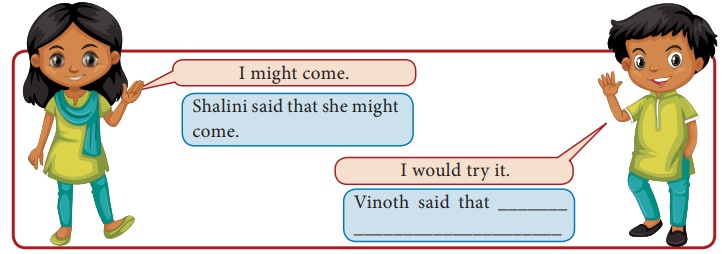
I might come. – Shalini said that she might come.
I would try it. – Vinoth said that he would try it.
4 With would rather, had better

I would rather fly. -> Chitti said that he would rather fly.
They had better go. -> Sophia said that they had better go.
5. In if-clauses and time-clauses

If I tidied my room, my dad would be happy.
– Sriram said that if he tidied his room, his dad would be happy.
When I was staying in Madurai Imet my best friend.
– Jaheer said that he had met his best friend when he had been staying in Madurai.
We do not usually change the modal verbs must and needn’t. But must can become had to or would have to and needn’t can become didn’t have to or wouldn’t have to if we want to express an obligation. Would/wouldn’t have to are used to talk about future obligations.

I must wash up.
– She said that she must wash up/ she had to wash up.
We must do it in June.
– He said that they must do it in June/they had to do it in June.
F. Read the following dialogue and report it.
Johnson : “What are you doing here, Suganthi? I haven’t seen you since June.”
Suganthi : “I’ve just come back from my holiday in Ooty.”
Johnson : “Did you enjoy it?”
Suganthi : “I love Ooty. And the people were so friendly.”
Johnson : “Did you go to Coakers Walk?”
Suganthi : “It was my first trip. I can show you some pictures. Are you doing anything tomorrow?”
Johnson : “I must arrange a couple of things. But I am free tonight.”
Suganthi : “You might come to my place. At what time shall we meet?”
Johnson : “I’ll be there at eight. Is it all right?”
Johnson asked Suganthi what she was doing there. And he said he had not seen her since June. Suganthi explained that she had just come back from her holiday in Ooty. Johnson wondered if she had enjoyed it. Suganthi told him that she loved Ooty and that the people had been so friendly. Johnson wanted to know If / whether she had gone to the Coakers Walk. Suganthi said that it had been her first trip and that she could show him some pictures. And then she asked him if he was doing anything the following day/the next day Johnson explained that he must arrange / had to arrange a couple of things. But he added that he was free at night. Suganthi suggested that he might come to her place and asked him at what time they could meet. Johnson said he would be there at eight. And finally he asked if/whether it was all right.
G. Tick the right choice (Indirect Speech).
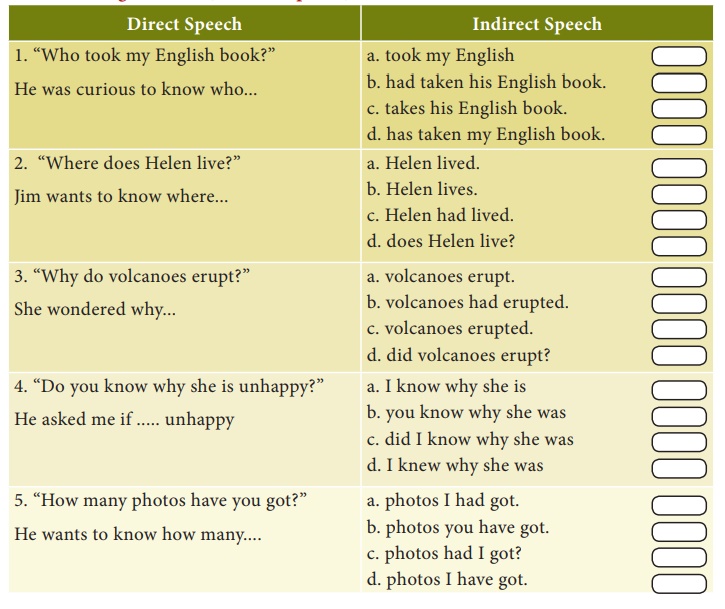
1. “Who took my English book?”
He was curious to know who
Indirect Speech : had taken his English, book.
2. “Where does Helen live?”
Jim wants to know where
Indirect Speech : Helen lives.
3. “Why do volcanoes erupt?”
She wondered why…
Indirect Speech : volcanoes erupt.
4. “Do you know why she is unhappy?”
He asked me if unhappy
Indirect Speech : I knew why she was
5. “How many photos have you got?”
He wants to know how many….
Indirect Speech : photos I have got.











